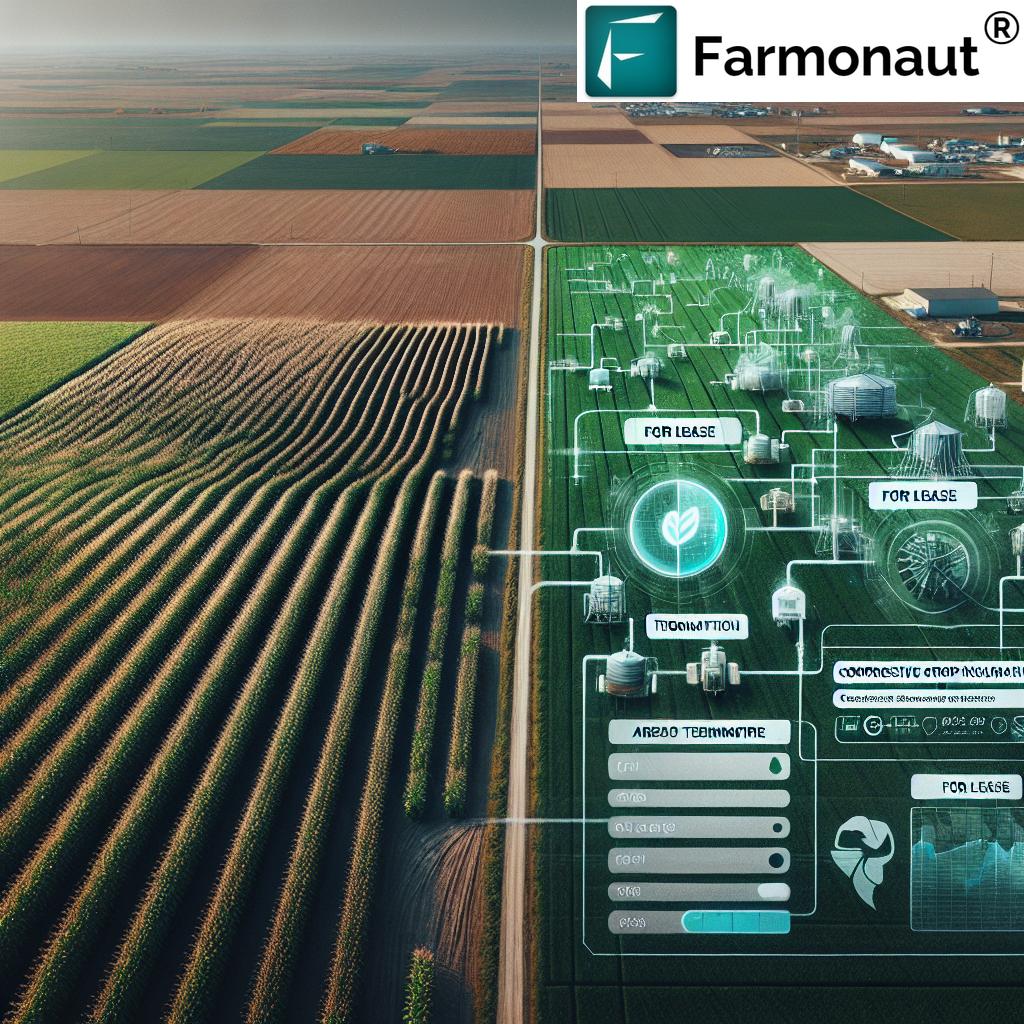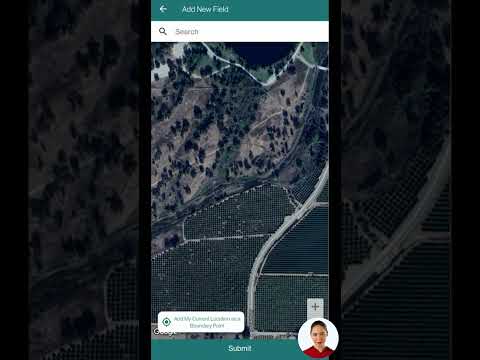Illinois Farm Lease Termination: Critical October 31 Deadline for Agricultural Land Management
“In Illinois, farm lease termination notices must be given at least 4 months before the end of the lease year.”
Welcome to Farmonaut’s comprehensive guide on Illinois farm lease termination and the crucial October 31 deadline. As leaders in agricultural technology and farm management solutions, we understand the importance of staying informed about legal requirements and industry trends. In this blog post, we’ll delve into the intricacies of farm lease termination in Illinois, exploring its impact on agricultural land management and providing valuable insights for both landowners and tenants.
Understanding the Illinois Farm Lease Termination Process
The farm lease termination process in Illinois is a critical aspect of agricultural land management that requires careful attention to legal requirements and timelines. Let’s break down the key components:
- Notice Deadline: October 31 is the most crucial date for many Illinois farm leases. This is the last day to serve a termination notice for leases that end on the last day of February.
- Lease Year: Most farm leases in Illinois operate on a March 1 to February 28/29 cycle, aligning with the agricultural season.
- Notice Period: The law requires that termination notices be given at least four months before the end of the lease year.
- Automatic Renewal: If proper notice is not given, many farm leases in Illinois automatically renew for another year under the same terms.
Understanding these key points is essential for effective agricultural land management and farm financial planning. At Farmonaut, we provide tools and resources to help you navigate these complex issues and make informed decisions about your farmland.

The Importance of Timely Lease Termination Notices
Serving a timely lease termination notice is crucial for several reasons:
- Legal Compliance: Adhering to the October 31 deadline ensures compliance with Illinois farm law.
- Financial Planning: Both landowners and tenants need adequate time to plan for the next agricultural season.
- Operational Flexibility: Timely notices allow for negotiations or seeking new lease arrangements.
- Risk Management: Proper notice helps in mitigating legal and financial risks associated with lease disputes.
At Farmonaut, we emphasize the importance of staying ahead of these deadlines. Our farm management tools can help you track important dates and manage your agricultural operations more efficiently.
Key Requirements for Lease Termination Notices
When preparing a lease termination notice in Illinois, it’s essential to include specific information and follow proper delivery methods:
- Content: The notice should clearly state the intent to terminate the lease and specify the termination date.
- Form: While written notice is strongly recommended, verbal notice may be sufficient in some cases.
- Delivery: Notices can be delivered in person, by certified mail, or by other provable methods.
- Timing: The notice must be received by the other party no later than October 31 for leases ending February 28/29.
Our agricultural risk management tools at Farmonaut can help you keep track of these requirements and ensure compliance with farmland leasing guidelines.
Impact on Agricultural Land Management
The October 31 deadline has significant implications for agricultural land management:
- Crop Planning: Timely notices allow farmers to plan for the next growing season, including crop rotation and input purchases.
- Soil Management: Proper notice ensures adequate time for soil testing and preparation for the next tenant or crop.
- Investment Decisions: Landowners can make informed decisions about property improvements or changes in land use.
- Market Adaptation: Both parties can adjust to changing market conditions and update lease terms accordingly.
At Farmonaut, we offer advanced soil productivity analysis tools that can aid in making informed decisions about land management and crop planning.
Try Farmonaut’s Web App for Advanced Farm Management

Financial Implications of Lease Renewals and Terminations
The decision to renew or terminate a farm lease can have significant financial implications:
- Rent Adjustments: Lease renewals provide an opportunity to adjust rental rates based on current market conditions and farm productivity.
- Capital Investments: Long-term leases may encourage tenants to make capital improvements to the land.
- Crop Insurance: Changes in lease arrangements can affect crop insurance coverage and premiums.
- Tax Considerations: Lease terminations and new agreements can have tax implications for both landowners and tenants.
Our farm financial planning tools at Farmonaut can help you analyze the potential impact of lease decisions on your agricultural business.
Navigating Lease Negotiations
Whether renewing a lease or negotiating a new one, consider the following factors:
- Fair Market Value: Research current rental rates for comparable farmland in your area.
- Productivity Metrics: Use soil productivity data and yield history to inform rental rates.
- Risk-Sharing: Consider flexible lease arrangements that account for yield and price fluctuations.
- Conservation Practices: Incorporate provisions for sustainable farming practices and soil health management.
Farmonaut’s precision agriculture technology can provide valuable data to support these negotiations, offering insights into field productivity and crop health.
Explore Farmonaut’s API for Custom Agricultural Solutions
“October 31 is a critical deadline for Illinois farm lease terminations, affecting thousands of agricultural land agreements annually.”
Leveraging Technology in Farm Lease Management
Modern agricultural technology plays a crucial role in effective farm lease management:
- Satellite Monitoring: Use satellite imagery to track crop health and productivity across leased land.
- Data Analytics: Employ big data analytics to make informed decisions about lease renewals and terms.
- Digital Record-Keeping: Maintain electronic records of lease agreements, notices, and communications.
- Precision Agriculture: Utilize precision farming techniques to optimize yields and demonstrate good land stewardship.
At Farmonaut, we offer cutting-edge satellite-based farm management solutions that can enhance your ability to manage leased farmland effectively.

Legal Considerations and Best Practices
To ensure smooth lease terminations and renewals, consider these legal best practices:
- Written Agreements: Always have a written lease agreement that clearly outlines all terms and conditions.
- Legal Review: Have an attorney familiar with agricultural law review your lease agreements.
- Documentation: Keep detailed records of all communications and transactions related to the lease.
- Dispute Resolution: Include provisions for dispute resolution in your lease agreement.
While Farmonaut doesn’t provide legal advice, our farm management tools can help you stay organized and compliant with lease requirements.
The Role of Crop Insurance in Lease Decisions
Crop insurance is a critical component of agricultural risk management and can significantly impact lease decisions:
- Coverage Levels: Lease terms may affect the level of crop insurance coverage available.
- Premium Costs: Insurance premiums can influence rental rates and lease negotiations.
- Yield History: Maintaining consistent lease arrangements can help establish a solid yield history for insurance purposes.
- Risk Allocation: Crop insurance can help balance risk between landowners and tenants in flexible lease arrangements.
Our crop insurance calculator at Farmonaut can help you estimate premiums and coverage levels to inform your lease decisions.
Access Farmonaut’s API Developer Docs for Custom Integration
Environmental Considerations in Farm Leases
Incorporating environmental stewardship into farm leases is becoming increasingly important:
- Conservation Clauses: Include provisions for soil conservation and sustainable farming practices.
- Water Management: Address water usage and quality protection in lease agreements.
- Carbon Sequestration: Consider incorporating incentives for practices that increase soil carbon content.
- Wildlife Habitat: Discuss management of non-crop areas for wildlife benefit.
Farmonaut’s satellite monitoring technology can help track the implementation and effectiveness of conservation practices on leased farmland.
The Future of Farm Leasing in Illinois
As we look to the future, several trends are likely to shape farm leasing in Illinois:
- Data-Driven Leases: Increased use of precision agriculture data in setting lease terms and rates.
- Flexibility: More flexible lease structures to adapt to volatile markets and weather conditions.
- Sustainability Focus: Greater emphasis on sustainable farming practices in lease agreements.
- Technology Integration: Incorporation of smart farming technologies in lease management and compliance.
At Farmonaut, we’re committed to staying at the forefront of these trends, providing innovative solutions to support modern farm management practices.
Download Farmonaut’s Android App for On-the-Go Farm Management

Illinois Farm Lease Termination Timeline
| Date | Action | Notes |
|---|---|---|
| October 1 | Begin preparation | Review lease terms, assess farm performance |
| October 31 | Deadline for notice | Last day to serve termination notice |
| November 1-30 | Notice delivery period | Ensure proper delivery methods |
| December 1 | Confirmation | Verify receipt of notice by tenant/landowner |
| February 28 | Lease end date | Typical end date for many farm leases |
| March-April | Soil testing | Conduct soil tests for new growing season |
| June-July | Crop insurance deadline | Finalize crop insurance arrangements |
| September | Financial planning | Begin financial planning for next year |
This timeline provides a structured approach to managing the farm lease termination process in Illinois. By following these key dates and actions, landowners and tenants can ensure they meet all legal requirements and set themselves up for a successful agricultural season.
Maximizing Farm Profitability Through Effective Lease Management
Effective lease management is crucial for maximizing farm profitability. Consider these strategies:
- Regular Performance Reviews: Conduct annual reviews of lease performance and farm productivity.
- Cost-Sharing Arrangements: Explore cost-sharing options for improvements that benefit both parties.
- Market Analysis: Stay informed about local land values and rental rates to ensure competitive terms.
- Long-Term Planning: Consider multi-year leases with built-in adjustment mechanisms for stability and flexibility.
Farmonaut’s agricultural economics tools can provide valuable insights to support these strategies and improve your farm’s financial outlook.
Get Farmonaut’s iOS App for Comprehensive Farm Monitoring

Conclusion: Navigating the Complexities of Illinois Farm Leases
The October 31 deadline for Illinois farm lease terminations is a critical milestone in agricultural land management. By understanding the legal requirements, leveraging technology, and adopting best practices in lease management, both landowners and tenants can navigate this process effectively. At Farmonaut, we’re committed to providing the tools and insights you need to make informed decisions about your farmland.
Remember, proper planning and communication are key to successful farm lease management. Whether you’re considering termination, renewal, or negotiation of farm leases, staying informed and proactive will help ensure the best outcomes for your agricultural operations.
For more information on how Farmonaut’s satellite-based farm management solutions can support your agricultural business, explore our range of services and tools designed to optimize your farm’s productivity and profitability.
Farmonaut Subscription Plans
Frequently Asked Questions
- Q: What happens if I miss the October 31 deadline for serving a lease termination notice in Illinois?
A: If you miss the October 31 deadline, the lease typically automatically renews for another year under the same terms. It’s crucial to mark this date and prepare well in advance to ensure compliance with Illinois farm law. - Q: Can a farm lease in Illinois be terminated verbally?
A: While verbal notice may be legally sufficient in some cases, it’s strongly recommended to provide written notice. Written notices provide clear documentation and help avoid potential disputes. - Q: How can Farmonaut’s tools assist in farm lease management?
A: Farmonaut offers satellite-based farm management solutions that can help track crop health, soil productivity, and overall farm performance. These insights can be valuable for lease negotiations, productivity assessments, and long-term planning. - Q: Are there any exceptions to the four-month notice requirement for farm lease terminations in Illinois?
A: Generally, the four-month notice is required by law. However, if both parties mutually agree to different terms in writing, exceptions can be made. It’s always best to consult with a legal professional for specific situations. - Q: How often should farm leases be reviewed and potentially renegotiated?
A: It’s advisable to review farm leases annually, even if they’re set for multiple years. This allows both parties to address any changes in market conditions, farm productivity, or personal circumstances. Renegotiation frequency can vary but should be considered at least every few years.
By staying informed about these key aspects of Illinois farm lease terminations and utilizing advanced agricultural management tools, you can ensure compliance with legal requirements while optimizing your farm’s operations and profitability.



